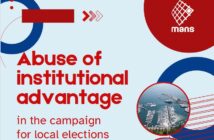This publication has come as a result of the project monitoring the procurement for public works, with the value of individual tenders exceeding 100,000 euro. In 2011 and 2012 this project was implemented by the Network for Affirmation of the Nongovernmental Sector (MANS), financially supported by the European Union Delegation to Montenegro.
Over the period observed MANS monitored all procedures for awarding public work contracts exceeding 100,000 euro in worth. We also reviewed several procurement procedures which took place before 2011, reported to us via the line for reporting corruption. Following detailed review, such examples showed some of the most drastic violations of the Public Procurement Law (PPL).
As a part of this publication, MANS particularly focused on most frequent violations of the Public Procurement Law recorded during the monitoring and investigation. These refer to favouring companies linked with decision-makers, subsequent increase of the overall deal value and introduction of additional works as a justification for higher final costs, extension of completion deadlines and failure to collect penalties stipulated in contracts, the violation of the principles of competition and transparency, and the conflict of interest situations among the participants to the public procurement procedures.
The investigation for the needs of this project was done solely pursuant to the documents obtained by invoking the Free Access to Information Law (FAI Law). To that effect, a voluminous amount of data was collected, including full tender dossier for certain public works, but also contracts signed by contracting authorities with successful bidders. Since one of the goals of this project was to increase transparency of the overall awarding process for public works contracts in Montenegro, MANS made this documentation available to the public at its web pages.
The documents were used for compiling the present case studies, but also for filing quite few criminal charges against state agencies acting as public works contracting authorities, as well as the participating companies and their owners suspected of violations to the PPL provisions.



